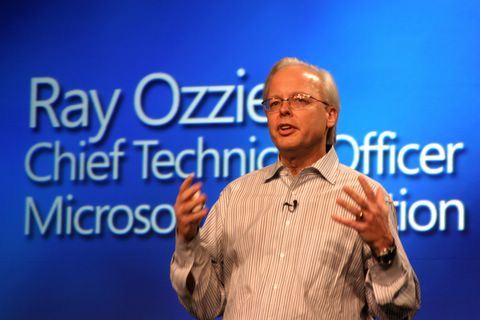With Ballmer on the way out, it’s time to start speculating on who will take over the world’s largest operating system company. Just who will be considered, and what kind of qualities must they bring to the table to get the job? Will Microsoft hold a Survivor-like challenge, voting candidates off the island and feeding the remaining contestants plain rice? Or will it end up being a boring, simple pick from a lineup of known suspects?
Ray Ozzie
As Microsoft’s former CTO, Ozzie was once tapped to save the company. But years of tangling with Ballmer made him step down in 2010. While there aren’t a lot of details as to just how and why the two butted heads, it’s also not hard to butt heads with Ballmer. The going wisdom on the man is that his rage was always just below the surface, and thus many workers presenting Ballmer with information would juke numbers or outright lie just to keep him from exploding in meetings.
That’s pretty much the exact opposite of how Ozzie works and presents himself. He’s a thoughtful visionary, metered in tone and easygoing by nature. That makes him, pretty much, the anti-Ballmer.
Is that what Microsoft needs right now? Absolutely. Of all the people in this list, Ozzie is the most likely, and probably the most well equipped, to help Microsoft return to its glory days when developers and users alike loved its products.
If I were Ray Ozzie, here’s what I’d do: First, I’d port the Windows UI layer onto the Linux kernel, base all future Windows releases on that kernel, and start clawing back some market share in the server market. I’d also rebrand Windows Phone with any other name, with the possible exception of “Hitler Phone.” Anything short of that would be a significant improvement for Windows Phone’s uptake efforts.
After all, Windows hasn’t exactly got the best reputation with consumers. When your average user thinks of Windows, they think of viruses, pop-up windows, broken DLLs and the general headache of desktop computing. Compare that to what people think of when they hear the word “Apple.” Pretty much the exact opposite of everything Windows stands for.
While I personally think it unlikely that Ozzie would come back to run Microsoft, he’s the sort of practical, reasonable visionary who could at least consider ideas like this. Ballmer, on the other hand, would be swinging a baseball bat at anyone who’d mentioned either of these ideas.

#!
Stephen Elop
After heading Nokia, it’d be a surprise if Elop isn’t on the shortlist to head Microsoft. Not that he has a very good track record: He was out of time, over budget, and had many smartphone OSes killed.
Elop has the chops to run an international business, but his flip-flopping at Nokia isn’t exactly a rousing endorsement. Still, he has many years of experience in trimming the fat and streamlining Nokia, for all the good it did them. That experience could come in handy if the next phase at Microsoft includes plans for trimming the fat and getting down to brass tacks.
Elop, it is rumored, was sent to Nokia to get the place ready for Windows Phone. While that seems to have worked out, with Nokia remaining loyal to the platform, everything else at Nokia, under his tenure, has disintegrated.
While Elop has the skill and experience to run Microsoft, his work at Nokia isn’t exactly a ringing endorsement.

#!
Jonathan Schwartz
Former Sun Microsystems CEO Jonathan Schwartz is probably the unlikeliest person Microsoft could possibly choose. He was a career Sun guy, and he only got the top job there because the board wanted him to sell off the firm. And he accomplished that goal.
Schwartz is on this list because I think he’d be a great choice for Microsoft. He’s the kind of CEO that is able to lead a reinvigoration without coming off as a slave driver. At Sun, while he wasn’t able to turn the company around (this was not his goal, really), he was able to change the culture and feeling of the company into one where people began to at least pretend they were innovating again.
The main reason I think Microsoft should choose Schwartz—and keep in mind this will never, ever happen—is that he gets the open-source world. Microsoft is now one of the largest contributors to the Linux kernel, and its cloud efforts are bringing developers and IT admins back into the Microsoft Server fold.
If the company could just embrace open source officially, instead of quietly doing so, it could really change its fortunes in the developer world. Microsoft has some incredible developers, and allowing the world to work with them on projects would benefit everyone, everywhere. I see Schwartz as the kind of guy who could bring this kind of openness to Microsoft.

#!
Dr. Laura Schlessinger
If there is one thing Microsoft needs more than anything else, it’s a group hug. The entire company needs to get together and hug it out. How else are you going to get past all the bad blood that exists up in Redmond?
Working at Microsoft is not a job, it’s a challenge. The company does not suffer fools gladly, and its process of project approval is damn near Thunderdome: Two projects enter, one project leaves. As a result, there’s a lot of back-stabbing, back-room dealing and high-profile fights where executives are forced out, such as in 2012 when Windows chief Steven Sinofsky left town.
Dr. Laura would be a good CEO because she could sit the company down and help to talk out their problems. She could help to heal those open wounds and calm the rough waters of management. Or, perhaps, Judge Judy would be a better choice.
But no matter who it is, Microsoft’s next CEO will be tasked with healing the abused children of Microsoft, with Ballmer playing the part of the estranged stepfather.

#!
Anyone from within
Microsoft is nothing if not insular. The fact is, the most likely choice for their next CEO will probably be someone already inside the company. Even folks who’ve left are now basically outsiders. Lots of mutterings have been surrounding Microsoft COO Kevin Turner, CFO/CMO Tami Reller, and Skype head Tony Bates.
I’m not so sure any of these folks would be a good choice, however likely they are to be the one tapped. The thing Microsoft needs right now, more than anything else, is a culture change. It feels as though the company is still competing in a 1990s marketplace. With the exception of Azure and Xbox, Microsoft’s products are starting to be seen as aging and out of touch. Windows Phone and Surface are the leading examples of this phenomenon: The Windows brand is just poison, despite what Microsoft thinks.
Years of end-user frustration mean that the brand is tarnished. Years of improvements in Linux mean that Windows on the server is no longer an option for any serious development house. And years of infighting means that Microsoft’s existing culture isn’t going to change if it’s suddenly being led by a product of that very culture.
I’m sure, in the end, Microsoft will choose one of its own. But it’ll be a lost opportunity, that’s for sure.





